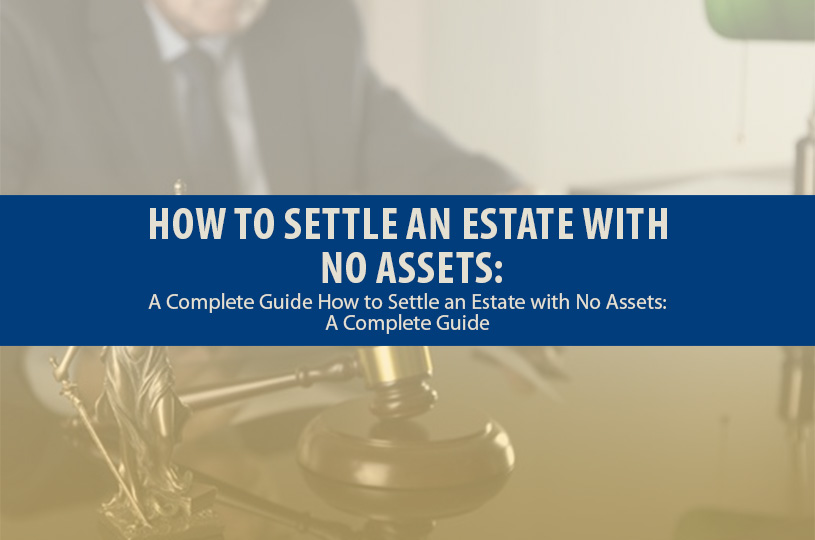When someone passes away, settling their estate can feel overwhelming, especially if there are no tangible assets involved. While it might seem counterintuitive to handle an estate with no assets, legal procedures often require it. Whether you’re dealing with an intestate probate process or looking for steps to settle an estate without probate, this guide will walk you through the essentials.
Understanding Estate Settlement
Estate settlement involves organizing and distributing a deceased person’s belongings, paying debts, and fulfilling their final wishes. But what happens when there’s nothing of monetary value to distribute?
In such cases, the executor’s primary responsibility is to address any legal and financial obligations of the deceased, even if the estate itself cannot cover those debts.
Steps to Settle an Estate Without Assets
Even with no assets, the estate settlement process still involves a series of steps. Here’s a detailed guide:
1. Determine if a Will Exists
- Check if the deceased left a will or testament. This document outlines their wishes regarding their estate, even if there’s nothing of value.
- If there is no will, the estate will likely go through the intestate probate process.
2. Identify the Beneficiaries
- If a will exists, the beneficiaries will be clearly listed.
- If no will is present, state laws determine who inherits what (if applicable).
3. Notify Creditors
- Executors must notify creditors of the person’s passing.
- Creditors can file claims against the estate, but without assets, these debts might remain unpaid.
4. File the Necessary Legal Documents
- If probate is required, file the relevant forms with the probate court in your state.
- Some states allow small estate affidavits to bypass probate, especially if there are no assets.
5. Close Financial Accounts
- Inform banks, insurance companies, and other financial institutions about the death.
- If no funds exist in these accounts, they can be closed without further action.
How to Settle an Estate Without Probate
In some cases, probate might not be necessary, particularly for estates with no significant value. Here are some probate-avoidance methods:
1. Small Estate Affidavits
Many states allow executors to use small estate affidavits for estates that fall below a certain value threshold. This simplified process can help avoid probate.
2. Transfer-on-Death (TOD) Accounts
If the deceased owned accounts with TOD designations, the funds automatically transfer to the named beneficiary without needing probate.
3. Joint Ownership
Jointly owned property (e.g., a house) typically transfers to the surviving owner without probate.
4. Trusts
If the deceased had set up a trust, assets within the trust bypass probate entirely.
Intestate Probate Process for Estates with No Assets
When someone dies intestate (without a will), their estate goes through probate regardless of whether they had assets. The process typically involves:
- Appointing an administrator for the estate.
- Identifying heirs under state laws.
- Resolving debts, even if no assets exist to pay them.
Common Challenges in Estate Settlement Without Assets
1. Unpaid Debts
- Executors may feel pressure to pay off debts from their own resources, but this is not legally required.
- Creditors can only claim from the estate’s assets.
2. Family Disputes
- Even with no assets, beneficiary disputes may arise over sentimental items or perceived entitlements.
- Mediation can help resolve these conflicts.
3. Legal Complexity
- Navigating the legal requirements of estate settlement can be challenging, especially without professional guidance.
How English Law Firm Can Help
At English Law Firm, we specialize in estate planning and settlement, ensuring a smooth process for families in Texas, Georgia, and Mississippi. Here’s how we can assist:
- Legal Guidance: Our attorneys provide step-by-step support through probate and estate settlement.
- Probate Avoidance Strategies: We help clients implement strategies like trusts and small estate affidavits.
- Dispute Resolution: We mediate and resolve family disputes, saving time and stress.
Contact English Law Firm today for a consultation and let our experienced team guide you through every step of the process.
Key Steps in Estate Settlement
| Step | Action | Notes |
| Determine if a Will Exists | Locate and review the will | Helps identify beneficiaries and wishes. |
| Notify Creditors | Inform creditors about the death | Required by law to allow claims against the estate. |
| File Legal Documents | Submit probate or affidavit forms | Based on state requirements. |
| Close Financial Accounts | Inform banks and institutions | Ensure accounts are closed properly. |
Estate Settlement FAQs
1. Can you settle an estate without probate?
Yes, if the estate qualifies for small estate procedures or contains assets that bypass probate, such as trust-held property or TOD accounts.
2. What happens to unpaid debts if there are no assets?
Unpaid debts typically remain unresolved. Creditors cannot claim payment from heirs or executors unless they co-signed the debts.
3. What is the role of an executor in an estate with no assets?
The executor ensures all legal requirements are met, including notifying creditors and filing necessary documents, even if there are no assets.

